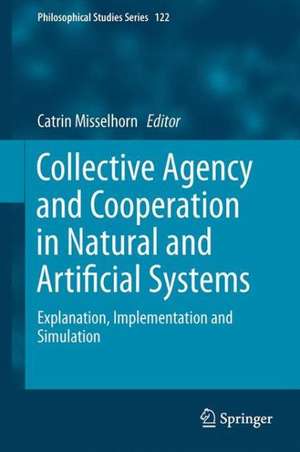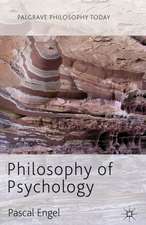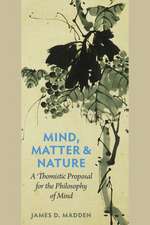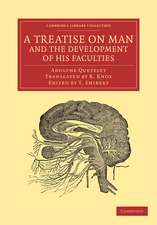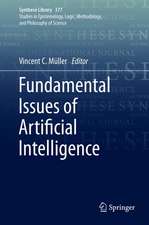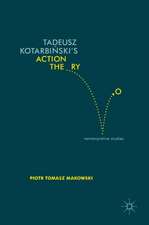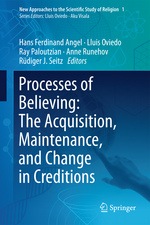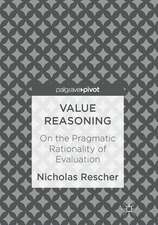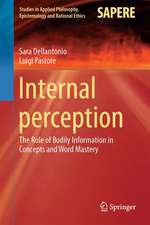Collective Agency and Cooperation in Natural and Artificial Systems: Explanation, Implementation and Simulation: Philosophical Studies Series, cartea 122
Editat de Catrin Misselhornen Limba Engleză Hardback – 14 sep 2015
The volume consists of four sections. The first section is dedicated to the concept of agency. The second section of the book turns to human-machine cooperation. The focus of the third section is the transition from cooperation to collective agency. The last section concerns the explanatory value of social simulations of collective agency in the broader framework of cultural evolution.
| Toate formatele și edițiile | Preț | Express |
|---|---|---|
| Paperback (1) | 371.11 lei 39-44 zile | |
| Springer International Publishing – 22 oct 2016 | 371.11 lei 39-44 zile | |
| Hardback (1) | 407.78 lei 3-5 săpt. | |
| Springer International Publishing – 14 sep 2015 | 407.78 lei 3-5 săpt. |
Din seria Philosophical Studies Series
- 15%
 Preț: 644.95 lei
Preț: 644.95 lei - 18%
 Preț: 1120.18 lei
Preț: 1120.18 lei - 18%
 Preț: 1005.43 lei
Preț: 1005.43 lei - 15%
 Preț: 640.06 lei
Preț: 640.06 lei -
 Preț: 381.21 lei
Preț: 381.21 lei -
 Preț: 391.61 lei
Preț: 391.61 lei - 15%
 Preț: 640.88 lei
Preț: 640.88 lei - 15%
 Preț: 639.25 lei
Preț: 639.25 lei - 18%
 Preț: 1221.51 lei
Preț: 1221.51 lei - 18%
 Preț: 947.18 lei
Preț: 947.18 lei - 18%
 Preț: 955.56 lei
Preț: 955.56 lei - 18%
 Preț: 950.96 lei
Preț: 950.96 lei - 15%
 Preț: 645.47 lei
Preț: 645.47 lei - 15%
 Preț: 635.79 lei
Preț: 635.79 lei - 15%
 Preț: 644.82 lei
Preț: 644.82 lei - 18%
 Preț: 950.66 lei
Preț: 950.66 lei -
 Preț: 386.00 lei
Preț: 386.00 lei - 15%
 Preț: 644.82 lei
Preț: 644.82 lei - 15%
 Preț: 642.18 lei
Preț: 642.18 lei - 15%
 Preț: 643.48 lei
Preț: 643.48 lei - 18%
 Preț: 944.99 lei
Preț: 944.99 lei - 15%
 Preț: 638.76 lei
Preț: 638.76 lei - 20%
 Preț: 553.25 lei
Preț: 553.25 lei - 20%
 Preț: 560.30 lei
Preț: 560.30 lei - 18%
 Preț: 951.29 lei
Preț: 951.29 lei - 18%
 Preț: 893.40 lei
Preț: 893.40 lei - 20%
 Preț: 566.75 lei
Preț: 566.75 lei - 18%
 Preț: 951.77 lei
Preț: 951.77 lei
Preț: 407.78 lei
Nou
Puncte Express: 612
Preț estimativ în valută:
78.03€ • 81.31$ • 64.61£
78.03€ • 81.31$ • 64.61£
Carte disponibilă
Livrare economică 13-27 martie
Preluare comenzi: 021 569.72.76
Specificații
ISBN-13: 9783319155142
ISBN-10: 3319155148
Pagini: 248
Ilustrații: XII, 311 p. 14 illus., 9 illus. in color.
Dimensiuni: 155 x 235 x 25 mm
Greutate: 0.88 kg
Ediția:1st ed. 2015
Editura: Springer International Publishing
Colecția Springer
Seria Philosophical Studies Series
Locul publicării:Cham, Switzerland
ISBN-10: 3319155148
Pagini: 248
Ilustrații: XII, 311 p. 14 illus., 9 illus. in color.
Dimensiuni: 155 x 235 x 25 mm
Greutate: 0.88 kg
Ediția:1st ed. 2015
Editura: Springer International Publishing
Colecția Springer
Seria Philosophical Studies Series
Locul publicării:Cham, Switzerland
Public țintă
ResearchCuprins
Part I: Concepts of Agency.- Collective Agency and Cooperation in Natural and Artificial Systems.-Cooperation with Robots? A Two-dimensional Approach.- The Participatory Turn – A Multidimensional Gradual Agency Concept for Human and Non-human Actors.- Part II: Human-machine Cooperation.- Embodied Cooperative Systems: From Tool to Partnership.- Historical, Cultural, and Aesthetic Aspects of the Uncanny Valley.- Ethical Implications Regarding Assistive Technology at Workplaces.- Some Sceptical Remarks Regarding Robot Responsibility and a Way Forward.- Part III: Collective Agency.- Planning for Collective Agency.- An Account of Boeschian Cooperative Behavior.- Choosing Appropriate Paradigmatic Examples for Understanding Collective Agency.- Can Artificial Systems be Part of a Collective Action?.- Is Collective Agency a Coherent Idea? Considerations from the Enactive Theory of Agency.- Part IV: Simulating Collective Agency and Cooperation.- Simulation as Research Method: Modeling Social Interactions in Management Science.- How Models Fail? A Critical Look at the History of Computer Simulations of Evolution in Cooperation.- Artificial Intelligence and Pro-social Behavior.
Notă biografică
Prof. Catrin Misselhorn holds the chair for the philosophy of science and technology at the University of Stuttgart and is the director of the Institute of Philosophy. Her research is situated at the intersection of philosophy, science and technological culture. She has published numerous articles in the area of socio-technical epistemology, the philosophy of mind and the philosophy of robotics in renowned international journals, e.g., The Monist, Minds and Machines. She is directing the project “Simulating Collective Agency and Decision Processes” in the cluster of excellence SimTech (Simulation Technologies) at the University of Stuttgart.
Textul de pe ultima copertă
This book brings together philosophical approaches to cooperation and collective agency with research into human-machine interaction and cooperation from engineering, robotics, computer science and AI. Bringing these so far largely unrelated fields of study together leads to a better understanding of collective agency in natural and artificial systems and will help to improve the design and performance of hybrid systems involving human and artificial agents. Modeling collective agency with the help of computer simulations promises also philosophical insights into the emergence of collective agency.
The volume consists of four sections. The first section is dedicated to the concept of agency. The second section of the book turns to human-machine cooperation. The focus of the third section is the transition from cooperation to collective agency. The last section concerns the explanatory value of social simulations of collective agency in the broader framework of cultural evolution.
The volume consists of four sections. The first section is dedicated to the concept of agency. The second section of the book turns to human-machine cooperation. The focus of the third section is the transition from cooperation to collective agency. The last section concerns the explanatory value of social simulations of collective agency in the broader framework of cultural evolution.
Caracteristici
Offers a new approach to collective agency Explains a new approach to Human-Machine Cooperation Provides a new interdisciplinary framework involving AI, robotics, cognitive science, management studies and philosophy
